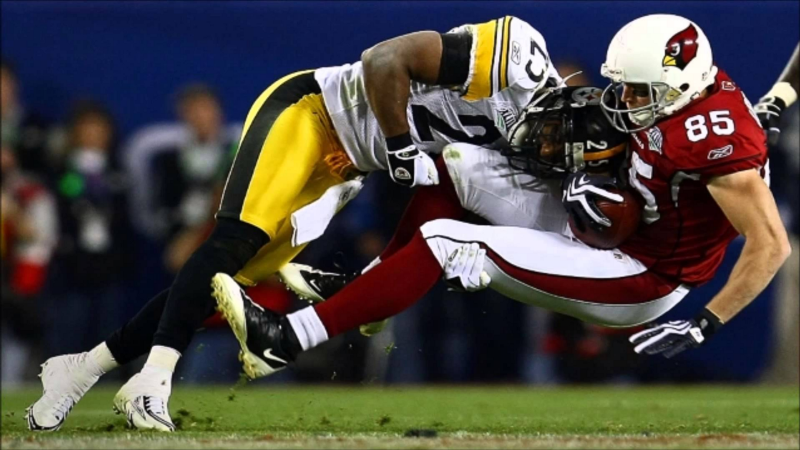David DeJesus – In His Own Words
By Steven Johnson (@SteveJohnson_12)
Follow David on Twitter (@David_DeJesus3)
Baseball is an awesome game. The sport does so much for those who choose to play it, and if blessed enough, make a career out of it. Countless stories have been told over the course of Baseball’s history. The sport is a unique game that has attracted players from all over the world. For some, it is the only opportunity to create a better life for the individual as well as their families.
It was his faith in God, the love of his family and Baseball that gave David DeJesus that opportunity. 13 seasons at the highest professional level of the sport opened the door for him to become the Cubs Pre & Postgame Analyst at CSN Chicago.
“It’s going great,” DeJesus said. “I’m fortunate that CSN gave me the opportunity to take on this role. David Kaplan was instrumental in getting me here, and now I love it each and every day more and more. My wife (Kim) and son (seven-year-old “Spidey“) recently arrived from California, where my son goes to school, so having family here adds even more to the whole experience.”
Currently, he resides in Wheaton with his family and DeJesus also has strong “bench support” as his in-laws live nearby, allowing David and Kim to excel at their careers. DeJesus’ remarkable journey has allowed him to be in this position. The veteran outfielder spent two seasons with the Cubs and was an integral part to the rebuilding of their product on the field.
Over the course of his 13-year MLB career, DeJesus was a productive player. The veteran outfielder hit a solid .275 with 99 career Home Runs, 573 RBI, and a .761 OPS. DeJesus made quite the name for himself in Kansas City, sharing the field with legendary players such as Carlos Beltran, Mike Sweeney, Billy Butler and Zack Greinke.
In fact, when Beltran was traded to the Houston Astros in 2004, DeJesus stepped up to become one of the faces of the organization
. 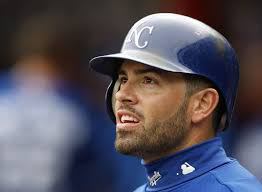
During the 2004 season, He became the Royals everyday center fielder and finished top-10 in AL Rookie of the Year voting that season. In 2006, the Royals rewarded the pro with a five-year contract extension. In 2008 with the Royals, he finished top-10 in the American League in hitting with a .308 Batting Average. He also had an all-around productive campaign with 159 hits, 25 doubles, seven triples, 70 runs, 12 HR, 73 RBI and a .818 OPS.
However, like most professional athletes, there were bumps along the road on the way to success. During the 2010 season, DeJesus tore the right tendon in his thumb during a game against the New York Yankees. It was horrible timing for the veteran as he was hitting .318 and was on pace for a 200-hit season.
DeJesus was forced to have season-ending surgery and just like that: he was shut down. Later, after spending eight seasons in Kansas City, DeJesus was traded to the Oakland Athletics. The deal came a season before he was eligible for free agency. DeJesus, at that point in his career, found himself at a crossroads.
“That was a crazy time,” DeJesus said. “I had the worst year of my career in 2011 at Oakland. Up to that point, I was a .290 hitter and then all of a sudden I’m hitting .240. I was ashamed of walking around town. I felt like I was wearing a .240 sign on my forehead — at least that’s what I thought people saw on me…”
“I didn’t see the blessings that I had. I was still a Major League baseball player with a wife and son — so many blessings surrounding me, but I couldn’t see them because I was wrapped up in my numbers.”
However, after that tumultuous season in Oakland, DeJesus changed his approach to the game — and to life itself.
“I was still nervous,” he said. “What’s going to happen? I’ve finally made my way to free agency, but I’m coming off the worst year of my career. Will anybody want my services? My agent called me around Thanksgiving and told me that the Giants and Cubs were both interested. San Francisco was offering more money, but Chicago was now home.”
“After my difficult year in Oakland, I wasn’t too keen on going back to the West Coast, so I took less money to stay near our adopted home. With Kim’s family so close, it was the best situation for my family. Talking to Theo [Epstein], he let me know right away: ‘Dave, these are going to be two tough years, but we’re building something here.’”
Esptein joined the Cubs as their new President of Baseball Operations in 2011. The much sought-after executive left Boston after winning two World Series titles with the Red Sox. DeJesus signed with the Cubs knowing a full rebuild was taking place. DeJesus was expected to fill the role of being a veteran leader, while also showing the younger Cubs the ropes, and being a productive player on the field.
“He [Theo] wanted me back in 2010 before I got injured with the Royals,” DeJesus said. “I had Tommy John surgery on my thumb, so he was going to pick me up right before the deadline during that time but didn’t because I got injured. It came around at another time and he picked me up and I’m super thankful for that.”
DeJesus served as a mentor for several young players, such as Anthony Rizzo & Starlin Castro, and also endeared himself to Cubs fans because of his hustle, work ethic & leadership. The team struggled during his two seasons with Chicago. In 2012, the Cubs lost 101 games.
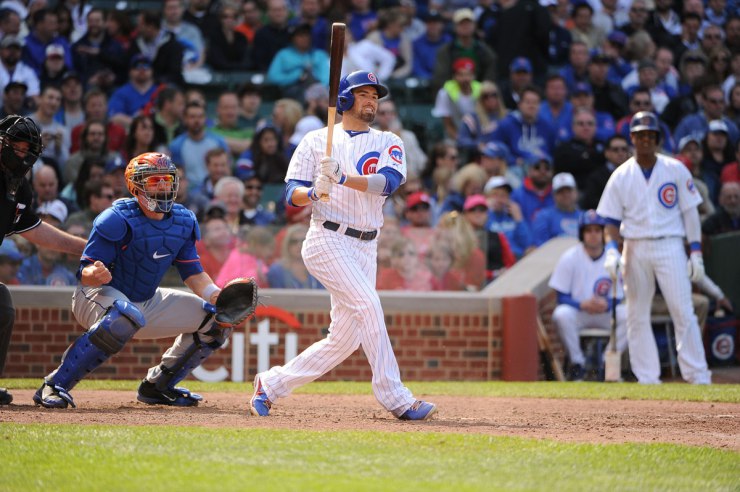
DeJesus, however, knew it was what he signed up for. Epstein made it a point to caution him of the difficult seasons that lied ahead for the Cubs organization. In 2013, he was traded from the Cubs to the Nationals (more on that later).
“It’s a funny story,” DeJesus said. “I played with the Cubs on ‘Family Day’ on a Sunday afternoon, and then on Monday morning, Kim and I are about to go to a juice bar when I get a call from Theo. That was a bit out of the ordinary, and when I answered it, Theo says, ‘David, we appreciate everything that you’ve done for us, BUT…’ And when he said that “But” word, I knew something was up.”
“BUT, you just got traded to the Washington Nationals.’ And what’s really weird is that the Nationals were coming to Wrigley to play the Cubs that very day! So I was cleaning out my locker in the Cubs’ clubhouse and walking down to the visiting clubhouse!”
DeJesus played just four games for the Nationals before he was then traded to the Tampa Bay Rays. Interestingly enough, while DeJesus originally signed up to help the Cubs rebuilding project, at Tampa Bay, he would experience what it was like to play for one of the central figures in the Cubs renaissance — Rays manager: Joe Maddon.
The Rays, at the time of the deal, were in the middle of an AL Pennant Race. DeJesus was counted on to bring veteran leadership, in addition to being another option for ‘Maddon & Co.’
It was a vastly different situation than the one he grew accustomed to in Chicago.
“So, I went to Joe’s office and he’s like: ‘Hey man’ and I sat down in front of him. He said: ‘I got two rules here: run the ball out and play sexy.’”
- Run the ball out.
- Play Sexy.
Two rules by Maddon that set the tone for the Rays. The two rules also served as somewhat of a foreshadowing to what the Cubs organization, their players & fans would become accustomed to: the future & popular Maddon catchphrases: #Respect90 and “If you look hot, wear it.”
So David, ‘Play sexy?’
“This guy came and said ‘Play Sexy,’ and I was like: ‘It’s something about that.’ It gave me that freedom to go out there and be myself.”
DeJesus instantly bought in to what Maddon was preaching. Actually, he did more than just ‘buy in,’ … he adjusted his style. As an outfielder for roughly 97 percent of his career, DeJesus served as a Designated Hitter for the Rays during his tenure there. DeJesus was serviceable in the role. In 85 career games at the position, he hit .268 with 18 doubles, two triples, eight Home Runs, 23 RBI, 32 Walks and a .795 OPS.
DeJesus credited Maddon with allowing him to be himself again, which made doing whatever the team needed to win a championship a breeze.
“That’s the thing that’s special about Joe,” DeJesus said. “He lets you take your skills and your personality, and let it play out on the field. He doesn’t restrict that. He gives you that freedom to go out and play just ‘free’. When I was with the Royals, whenever we played the Rays, we noted that their bench was always having fun. He brought ‘fun’ back into the game, and it was special. To me, as a player, I appreciated that.”
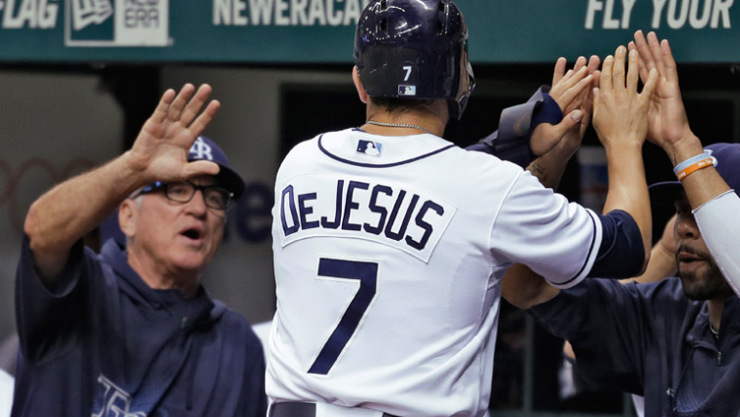
The Rays finished the 2013 season with a 92-71 record. They finished second in the AL East and beat the Cleveland Indians 4-0 in the 2013 AL Wild Card Game. They then ran into the eventual 2013 World Series Champions: the Boston Red Sox and bowed out in four games to them in the 2013 American League Division Series.
DeJesus would spend three seasons with the Rays before finishing his 13-year MLB career with the Los Angeles Angels of Anaheim. A critical goal for DeJesus’ career was that he wanted to be the quintessential professional and teammate. He always wanted to be the person that teammates could come to for advice and guidance… whether it’d be their approach or just life in general.
“I just tried to be the best player and best teammate I could be,” he said. “I wanted to be a guy who could pick up teammates if they wanted to bounce something off me and an encourager to anyone who might be going through a rough time. I’ve been through highs and lows in baseball and in life, so I can share my experiences and how I handled them.”
“My time in Tampa Bay was really a cool time because I got close friendships with people like Chris Archer and have a good relationship with him. Steven Souza’s one of my good friends still, right now, Brandon Guyer and others. Baseball and life in general, is about relationships. Yes, winning is a goal, but at the end of the day, it’s all about the relationships that you establish.”
That’s what makes the sport of Baseball special. It is about the relationships you develop with those blessed to be a part of the same fraternity that so few are in. It is about the blessings and success that you get from the game after you work hard and sacrifice so much to get to that level. It is even about finding something outside of the game… something DeJesus is very proud to declare.
“Can I tell my story?” DeJesus asked me before concluding our interview.
It is a story that needs to be told.
“Throughout my career, I attended Baseball Chapel pretty regularly. I thought it was the right thing to do. But during the 2011 season in Oakland, when I was struggling with my game, I realized that I couldn’t do this game of baseball and more importantly, this game of life, by myself. I realized I needed a Savior.”
“I was in Toronto on a Friday night. I just… I just broke down in my hotel room. The pressure of being a husband… a new Dad… hitting in the low .200’s… It broke me to a point where I prayed, ‘Lord, I cannot do this myself. Lord, I want you to take these burdens off me…because you said you would.”
“At that point, I knew that Jesus Christ was behind me! Christ was in my heart and I knew that I didn’t have to ‘perform’ any more to experience ‘worth.’ Everything has already been done for me through Christ’s death and resurrection!”
“I thought being a Christian meant ‘doing things’ — ‘earning’ my salvation. But once you accept Christ into your life, you receive His free gift! Now it’s living in that grace and that love that God has for me! And that has been my motivation every day since that night in Toronto! I’m so thankful for everything — including my new role with CSN — and trying to raise my son to know Jesus Christ.”
David’s test in life was his testimony. Because he gave his life to God, he is being blessed in abundance. His test was indeed his testimony. He is not only living his life for his family and his love and passion for the game of Baseball, but because of his love, passion and appreciation of our Lord and Savior. It is an important lesson in life that has always stood the test of time.
Now, DeJesus is at peace with where God has brought him. He is enjoying his role as the Cubs Pre & Postgame analyst for CSN. He acknowledges that there are differences in being a player and an analyst, but welcomes the challenge of walking that line between player and analyst.
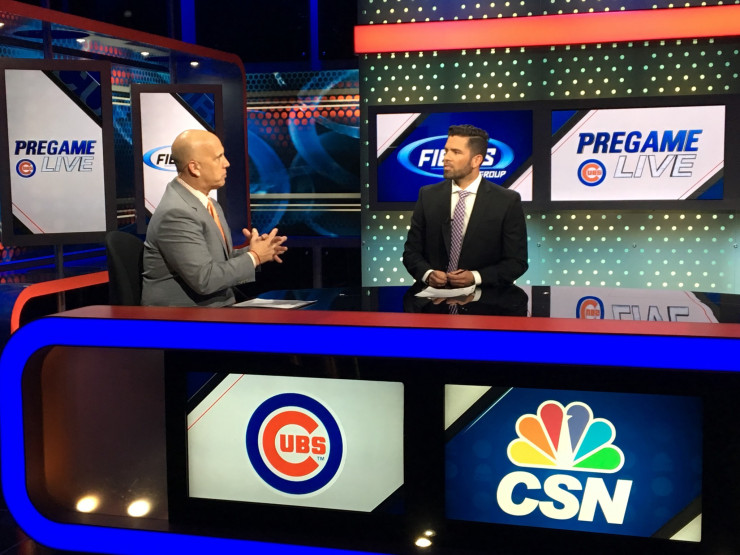
“The hardest thing is calling it out because we’re so engrained in us when it comes to picking each other up. That’s the toughest thing to do, because it’s hard to get away from the ‘Big League Mentality’ when I’ve been in there for so long.”
It has been an interesting transition for DeJesus thus far, but he has been helped by numerous people along the way. In addition to his faith in God, the DeJesus family and other colleagues have been instrumental in his shift to television analyst.
“Dave Kaplan has been a great help for me,” he said. “This guy has helped me out. We’ve watched tape together. We’re always talking and he’s giving me little tips. He’s patient with me and I’m so thankful that he’s opened himself up to help me out. I never would have thought if you said three years ago that I would I be an analyst for a baseball team or a baseball game. I’d say ‘No way,’ because I never really thought I was comfortable behind the camera. You never really know.”
DeJesus treats every show just like he treated every game in his career. He gives 100% in his preparation and is always eager to improve and learn more about the business but there’s one thing he absolutely does before every show. It is his current ‘Pregame ritual.’
“I pray each and every day before I get on that TV,” he said. “Because I know that I can’t do this by myself. The Lord is always there behind me.”
Whether it is baseball, working in television or living his everyday life, DeJesus has an outlook on life that can be applied to any facet of it:
“Let me be a guy that can walk alongside of somebody, put my arm around them and be like: ‘Hey man, it’s OK, we’ll get them tomorrow,’ he said. “That’s the cool thing about Baseball, both in watching it and playing it.”
His testimony truly is the story of a lifetime…
Share this:


